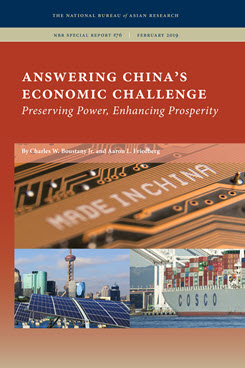Hungary's Stand Against US Pressure: Preserving Economic Links With China

Table of Contents
Hungary's Economic Dependence on China
Hungary's economic relationship with China is multifaceted and deeply intertwined, representing a significant aspect of its overall economic strategy. This dependence is rooted in substantial Chinese investment and a thriving bilateral trade relationship.
Investment and Infrastructure
Chinese investment in Hungary's infrastructure has been substantial, significantly boosting the country's economic development. A prime example is the Budapest-Belgrade railway, a major infrastructure project with significant Chinese involvement. This project, along with others, has generated numerous jobs, introduced advanced technologies, and improved Hungary's connectivity within the region. Over €5 billion Euros have been invested in large-scale infrastructure projects since 2010, showcasing China's commitment to Hungary's development. Other notable projects include investments in the energy sector and manufacturing, further strengthening the economic ties between the two nations.
- Job Creation: Thousands of jobs have been created through these projects, contributing significantly to Hungary's employment figures.
- Technological Advancement: Chinese investment has brought advanced technologies and expertise to Hungary, fostering innovation and improving productivity.
- Improved Infrastructure: Modernized infrastructure, including transportation and energy networks, has enhanced Hungary's economic competitiveness.
Trade Relations and Exports
Bilateral trade between Hungary and China has experienced significant growth in recent years. Hungary exports agricultural products, machinery, and pharmaceuticals to China, while importing a wide range of manufactured goods. The Chinese market presents a vital opportunity for Hungarian businesses to expand their reach and increase exports. The volume of trade has consistently increased, highlighting the mutually beneficial nature of this economic partnership. For example, agricultural exports to China have doubled in the last five years.
- Key Exports: Agricultural products (wine, meat), machinery, pharmaceuticals.
- Key Imports: Consumer electronics, machinery, textiles.
- Trade Volume Growth: Consistent double-digit growth in bilateral trade volume over the past decade.
Access to Chinese Markets
Access to the vast Chinese consumer market is a key driver behind Hungary's engagement with China. This access allows Hungarian businesses to tap into a massive market, boosting exports and economic growth. Several trade agreements and initiatives have facilitated this access, further strengthening the economic links between the two countries. This market access is particularly significant for Hungarian agricultural producers and manufacturers.
- Market Access Agreements: Facilitating smoother trade and reducing bureaucratic hurdles.
- Export Opportunities: Significant growth potential for various Hungarian products within the Chinese market.
- Economic Diversification: Reducing dependence on traditional European markets.
Geopolitical Considerations and US Pressure
Hungary's relationship with China exists within a complex geopolitical context, characterized by pressure from the United States and internal balancing acts within the EU.
Hungary's Balancing Act
Hungary's membership in both the European Union and NATO necessitates a delicate balancing act in its foreign policy. The country maintains an independent foreign policy approach, prioritizing its national interests. US pressure on Hungary to curtail its economic ties with China stems from concerns about China's growing global influence and its potential impact on regional security. However, Hungary views its relationship with China as strategically beneficial for its economic development.
- EU Membership: Obligations and expectations within the European Union framework.
- NATO Membership: Commitment to collective security within the North Atlantic Treaty Organization.
- Independent Foreign Policy: Prioritizing national interests in international relations.
Resistance to Sanctions and Boycotts
Hungary has shown reluctance to join EU-wide sanctions against China, prioritizing its economic ties. This stance has resulted in tensions with some EU members and the United States. The potential consequences of defying US pressure include strained diplomatic relations and potential economic repercussions. However, Hungary's domestic political landscape heavily influences this decision.
- Economic Considerations: Prioritizing the economic benefits of the relationship with China.
- Domestic Political Landscape: The government's domestic political considerations influence its foreign policy decisions.
- Potential Risks: Economic and diplomatic repercussions of defying US pressure.
The Visegrád Group and Regional Influence
Hungary's involvement in the Visegrád Group (V4), alongside the Czech Republic, Poland, and Slovakia, influences its China policy. The V4 countries share a common interest in fostering economic ties with China, and there's potential for regional cooperation on infrastructure projects and trade initiatives. This regional collaboration strengthens their collective bargaining power and influence in their relations with China.
- Regional Cooperation: V4 collaboration on China-related economic initiatives.
- Strengthened Bargaining Power: Joint efforts to improve trade and investment opportunities.
- Central European Influence: Shaping the regional landscape in Central Europe.
Future Prospects of Hungary-China Economic Relations
The future of Hungary-China economic relations appears promising, with continued growth and investment projected. However, potential challenges and risks must be considered.
Continued Growth and Investment
Further growth in investment and trade between Hungary and China is anticipated, particularly in areas such as technology and renewable energy. Both countries stand to benefit from long-term strategic cooperation. New initiatives and projects are likely to emerge, further solidifying this relationship.
- Technological Cooperation: Potential for joint ventures in technological development and innovation.
- Renewable Energy Projects: Collaboration on renewable energy infrastructure and technologies.
- Long-Term Strategic Partnership: Mutual benefits for both countries through continued cooperation.
Potential Challenges and Risks
Increasing economic dependence on China presents potential risks for Hungary. Geopolitical shifts, trade disputes, or economic downturns in China could negatively impact the Hungarian economy. Diversification of economic partnerships is crucial to mitigate these risks.
- Geopolitical Risks: Potential for disruptions due to changing geopolitical dynamics.
- Trade Disputes: The impact of potential trade wars or disputes between China and other countries.
- Economic Diversification: The importance of diversifying economic partners to reduce risk.
Conclusion:
Hungary's unwavering commitment to preserving its economic links with China, despite considerable US pressure, demonstrates a strategic prioritization of national interests. This calculated approach leverages the significant economic benefits derived from the robust Hungary-China economic relationship, including substantial Chinese investment in infrastructure and access to lucrative markets. While the geopolitical implications are complex, and risks exist, the trajectory suggests a continued strengthening of these ties. Understanding the dynamics of Hungary-China economic relations is crucial for comprehending the evolving geopolitical landscape in Central Europe and beyond. Further research into this complex relationship, including analysis of potential risks and mitigation strategies, will shed light on the future of this significant partnership.

Featured Posts
-
 Nba Disciplinary Action Anthony Edwards Fined 50 000
Apr 29, 2025
Nba Disciplinary Action Anthony Edwards Fined 50 000
Apr 29, 2025 -
 Brain Drain The Global Scramble For Us Researchers Following Trump Era Funding Reductions
Apr 29, 2025
Brain Drain The Global Scramble For Us Researchers Following Trump Era Funding Reductions
Apr 29, 2025 -
 Blockchain Analytics Leader Chainalysis Integrates Ai Through Alterya Purchase
Apr 29, 2025
Blockchain Analytics Leader Chainalysis Integrates Ai Through Alterya Purchase
Apr 29, 2025 -
 Securing Capital Summertime Ball 2025 Tickets Tips And Strategies
Apr 29, 2025
Securing Capital Summertime Ball 2025 Tickets Tips And Strategies
Apr 29, 2025 -
 Nyt Spelling Bee March 13 2025 Complete Solution Guide
Apr 29, 2025
Nyt Spelling Bee March 13 2025 Complete Solution Guide
Apr 29, 2025
